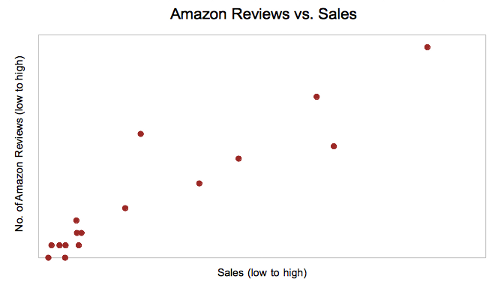To start out the new year, I reviewed XML Press book sales for the last three years. The actual numbers weren't a big surprise; we track sales closely. But I decided to look deeper and see what I could learn. Here are some results.
Reviews and sales
I've always believed that reviews, positive or negative, help sales, so since I wanted to do a column on reviews, I started by plotting the number of reviews on Amazon versus the number of books sold. It turns out there is a near perfect correlation; the more reviews, the more sales. You can see that in the chart below (the titles and exact numbers are not shown, but the trend is still obvious). I expected some correlation, but even with a couple of outliers, I never expected it to be as close as this.
Of course, correlation is not causation, so I can't tell you that generating more reviews will generate more sales. In fact, you can make a strong argument that the reverse is true. That is, the more copies of a given book you sell, the more people there are to review that book and, therefore, the more reviews you should see. While that seems logical, I don't think it's the full story. It turns out that the ratio between sales and reviews varies by a factor of more than three, and there is only a slight correlation between sales and that ratio (you get somewhat fewer reviews/copies-sold as sales increase, but the drop-off is not uniform), and I could find no other correlations with the ratio (I looked at age of books, quality rankings, and prices, with no results).
Ratings, quality, and sales
It also looks like there is little correlation between the Amazon ratings and sales. Our best-selling book has the second-worst average star rating (3.7) and a couple of the worst sellers have average 5-star ratings. Fortunately, we don't have any books with really bad reviews (even our few 1-star and 2-star reviews tend to be peripheral, e.g., complaining about price or saying the book didn't match that reader's skill level). I suspect a few devastating reviews might make a big difference, but at least within the narrow range of ratings for our books (lowest average 3.0 and highest 5.0), the actual ratings don't correlate with sales.
I also looked at more subjective measures of quality and concluded that while people complain about typos and grammatical errors, they don't seem to have much of an effect on sales. Assuming the book does a good job delivering its message, the only subjective measures that I think have a direct impact on sales are the target audience, the focus of the book, and the author.
- Audience: Of course you want a large audience, but even more important is having a clearly defined audience. One of our best sellers has a rather small audience, but it is clearly defined (Sarah Maddox's book, Confluence, Tech Comm, Chocolate). It seems like everyone who uses Confluence has a copy.
- Focus: Using Sarah's book as an example again, there is no question what the focus of the book is (it's right in the title, though I suppose chocolate might be a bit of a diversion). With the exception of one reviewer who complained that a book about Confluence didn't cover MindTouch or MediaWiki, I think anyone can easily see what the book is about. As I look at our other books, I can see a similar trend; books with a clearly defined, specific audience generally (but not always) do better, even if the audience might be small.
- Author: I've always been convinced that the author is the most important element in book sales. Some of that is obvious (after all, the author wrote the book), but beyond the quality of the book, the author's efforts in promoting his or her book are very important.
Some final thoughts
So, what does it all mean? I'm not 100% sure, and I'm not a statistician, but here are a few things I have concluded:
- Number of reviews on Amazon correlates strongly with sales. Even if I can't prove causation, the correlation is strong enough that we are redoubling efforts to get reviews.
- At least for books that don't have any devastating reviews, quality ratings do not correlate with sales. That doesn't change our commitment to providing quality books, but combined with the next point, it argues for broadening our quality efforts to look more closely at audience and focus.
- A clear focus, both in terms of content and audience, helps drive sales. That starts with a book proposal and continues through development, production, and marketing.
- The author makes a big difference in stimulating sales, both through his or her visibility in the community and his or her active marketing.
Finally, I suggest that everyone, whether you run your own business or not, take some time to reflect on your past year and see whether you can learn lessons that go at least a bit deeper than raw sales/income figures.
Best wishes to all for a healthy, happy, and prosperous New Year.
Richard L. Hamilton is the founder of XML Press, which is dedicated to producing high quality, practical publications for technical communicators, managers, content strategists, and marketers and the engineers who support their work. Richard is the author of Managing Writers: A Real-World Guide to Managing Technical Documentation, and editor of the 2nd edition of Norm Walsh's DocBook: The Definitive Guide, published in collaboration with O'Reilly Media.
